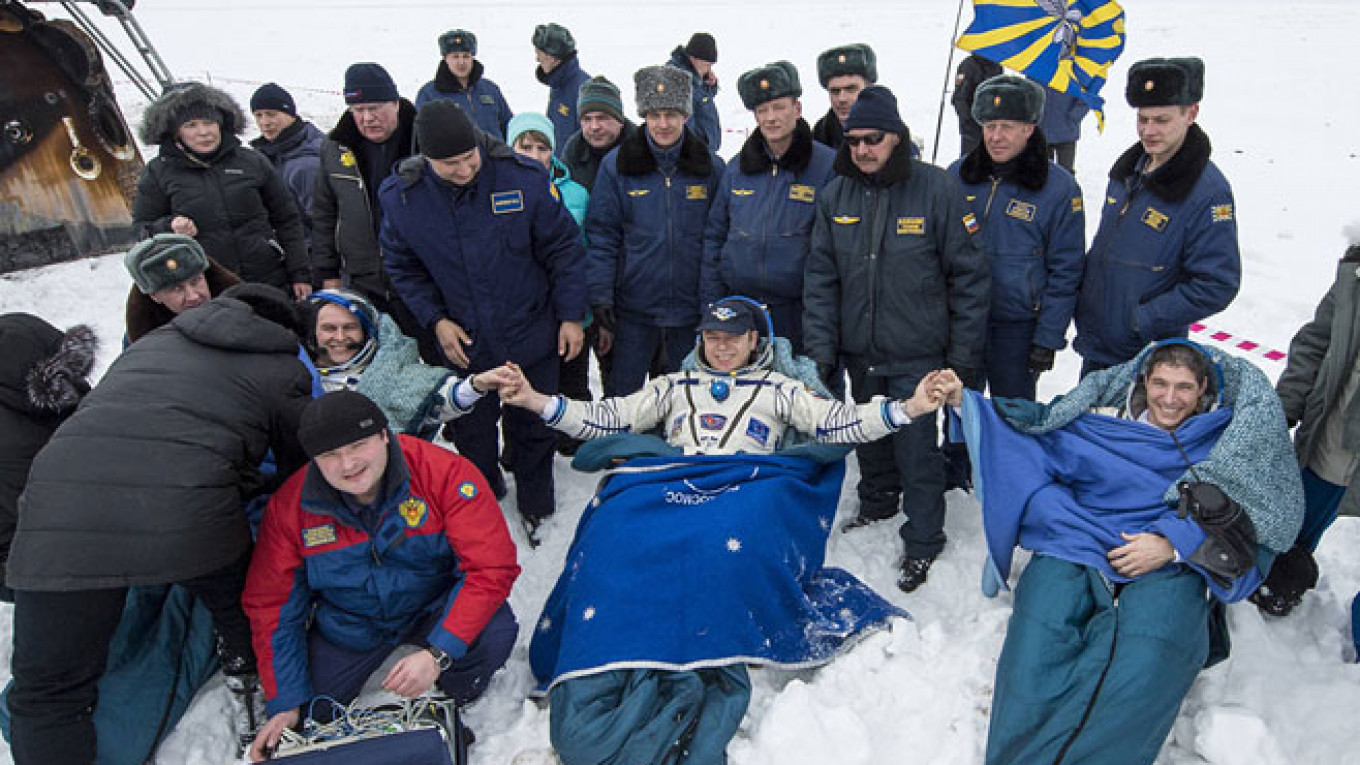ALMATY, Kazakhstan — A U.S. astronaut and two Russians who carried a Sochi Olympic torch into open space landed safely and on time on Tuesday in Kazakhstan, defying bad weather and ending their 166-day mission aboard the International Space Station.
“We have a landing!” read a huge television screen at Russia’s Mission Control outside Moscow as the descent capsule hit the frozen ground at 9:24 a.m. (3:24 a.m. GMT) southeast of the town of Zhezkazgan in Kazakhstan.
"Safe arrival back on Earth," said a NASA television announcer while all-terrain rescue and recovery vehicles were shown trundling across a snowy steppe to the Soyuz TMA-10M capsule. "The crew are reported to be in good health," NASA said.
Inside the capsule were former ISS commander Oleg Kotov and flight engineers Sergei Ryazansky and Michael Hopkins from NASA. The trio launched together into space on Sept. 25.
Shortly afterwards, the space travelers were seated in semi-reclined chairs in the deep snow and covered with blue blankets to protect them from strong gusts of wind.
Kotov, the most experienced astronaut in his crew, was shown waving his left hand with a palm black from the soot of the descent capsule, which was charred on re-entry.
Rookie Hopkins smiled as a doctor checked his pulse.
In addition to working on 35 science experiments, Kotov and Ryazansky carried the unlit Olympic torch for the 2014 Winter Olympic Games outside the station during a spacewalk on Nov. 9.
They left behind a small crew headed by Japan's Koichi Wakata, the first Japanese national to command the station. Three more crew members are due to arrive later this month.
Severe weather in Kazakhstan had threatened to delay the Soyuz's landing.
Before their undocking from the ISS, fog and low visibility had prevented airborne rescue and recovery teams from getting to Zhezkazgan, a town about 150 kilometers from the remote landing site on the windswept flatlands, a Russian space industry source said.
But Russian officials decided to go ahead with the landing after reviewing weather forecasts and the status of recovery crews.
"There is a lot of snow on the ground and temperatures are hovering in the single-digits [Fahrenheit]," said NASA mission commentator Dan Huot.
Due to severe weather conditions, it was decided not to set up an inflatable tent for routine medical tests at the landing site. Instead, the crew underwent just quick tests before being flown by helicopters straight to the local Kazakh town of Karaganda, where a formal welcome ceremony would be held.
The U.S.-Russian space partnership so far has not been affected by tensions over Ukraine. The countries lead the 15-nation space station program.
The $100 billion research complex, which flies about 418 kilometers above Earth, has been permanently staffed by rotating crews of astronauts and cosmonauts since November 2000.
A Message from The Moscow Times:
Dear readers,
We are facing unprecedented challenges. Russia's Prosecutor General's Office has designated The Moscow Times as an "undesirable" organization, criminalizing our work and putting our staff at risk of prosecution. This follows our earlier unjust labeling as a "foreign agent."
These actions are direct attempts to silence independent journalism in Russia. The authorities claim our work "discredits the decisions of the Russian leadership." We see things differently: we strive to provide accurate, unbiased reporting on Russia.
We, the journalists of The Moscow Times, refuse to be silenced. But to continue our work, we need your help.
Your support, no matter how small, makes a world of difference. If you can, please support us monthly starting from just $2. It's quick to set up, and every contribution makes a significant impact.
By supporting The Moscow Times, you're defending open, independent journalism in the face of repression. Thank you for standing with us.
Remind me later.






